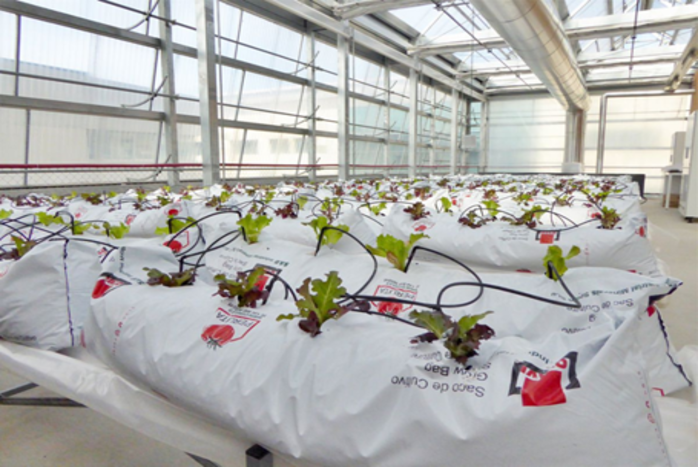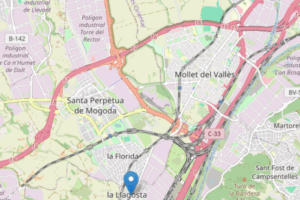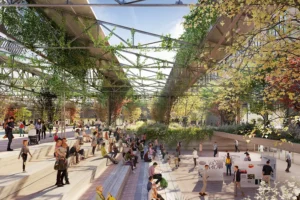
GESTHERB: Decision support system for weed management
October 20, 2023
New biodegradable fragrance microencapsulation techniques for detergents to avoid the release of microplastics into the environment
November 28, 202324/10/2023
Cities are responsible for 80% of global energy consumption, 70% of total waste generation and 60% of greenhouse gas emissions of the planet. For this reason, measures need to be taken to transform cities into more sustainable, circular ecosystems.
The BINAFET project, in which the Construction Research and Innovation Group (GRIC) at the UPC participates, builds a strategy for integrating flows between buildings and urban agriculture (UA) as a key and necessary step for the ecological transition in cities. This integration with its smart management acts as a nature-based solution between a building and its greenhouse. Synergies are created between building needs to reduce the air temperature and CO₂ to a maximum, and the benefits of local resources and vegetation. Waste flows generated in the building (for example, CO₂, residual heat, residual water) and in UA can be redirected to improve the quality of indoor air, the building’s and the greenhouse’s energy efficiency, the crop yield and the local production of food. These flows will be managed in a smart way through predictive control and automatic learning, which will contribute to the digital transformation.
The BINAFET project proposes symbiotic interaction between buildings and urban agriculture to boost circularity, generate flows of residual heat, residual water and CO₂ to reduce energy consumption and contamination of urban water and to increase nutrient production and the local production of foods. This system is based on better air quality inside the building and the local, sustainable production of foods to improve health and people’s quality of life. Making cities more sustainable is one of the planetary challenges of the twenty-first century and involves strategies to mitigate and adapt to climate change, increase energy efficiency and improve the management of natural resources and waste. The result will be a leading project in agricultural solutions integrated into smart and efficient buildings.
Participants in the project include a team of researchers at the Universitat Politècnica de Catalunya - BarcelonaTech (UPC) and the Autonomous University of Barcelona (UAB). The UPC team is comprised of members from the Construction Research and Innovation Group (GRIC) and the Miquel Agustí Foundation (FMA). GRIC is in charge of modelling the performance of the proposed agricultural system integrated into buildings, implementing a prototype of agricultural solutions integrated into smart buildings to demonstrate the BINAFET concept and analysing along with the UAB team the feasibility and functionality of the BINAFET concept in terms of scalability and sustainable performance.
Budget and funding
BINAFET has a duration of two years (November 2022 – November 2024). The budget for the UPC group is €149,500, which is funded by the Spanish State Research Agency of the Ministry of Science and Innovation and the EU Next Generation fund, through the State Programme to Promote Scientific-Technical Research and its Transfer (Strategic Projects Oriented towards the Ecological and Digital Transition) (Project TED2021-130047B-C22 funding by MCIN/AEI/10.13039/501100011033 and by the European Union “NextGenerationEU”/PRTR).


You want to know more?
Related Projects
- A research team led by the Mobile Robotics and Artificial Intelligence Group (RAIG) of the Institute of Robotics and Industrial Informatics (IRI, CSIC-UPC) at the Universitat Politècnica de Catalunya - BarcelonaTech (UPC) is taking part in the European project TRIFFID (auTonomous Robotic aId For increasing FIrst responDers efficiency). The aim is to develop a platform to support rescue operations in emergency situations. The initiative combines advanced robotics, artificial intelligence and immersive interfaces to enhance safety and accelerate response in hazardous environments.
- The Centre of Technological Innovation in Power Electronics and Drives (CITCEA) of the Universitat Politècnica de Catalunya - BarcelonaTech (UPC) is leading a European project that redesigns the current energy system to stabilise the power grid in the face of high renewable energy penetration. The proposed solutions involve using the loads that consume energy to help balance the grid.
- A team from the Environment Centre Laboratory (LCMA) of the Universitat Politècnica de Catalunya - BarcelonaTech (UPC) is taking part in a study commissioned by the city councils of la Llagosta, Mollet and Santa Perpètua (in Vallès Occidental), with the main objective of identifying the impact of industrial plants on the generation of unpleasant odours and continuously monitoring air quality in these municipalities.
- Researchers from the Concrete Sustainability and Smart Structures (C3S) research group, part of the Construction Engineering (EC) group at the Universitat Politècnica de Catalunya - BarcelonaTech (UPC), are leading the CIRC-BOOST project, which aims to promote sustainability, industrial competitiveness and greater resource efficiency in the European construction sector.




